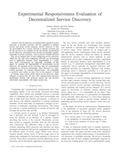Experimental Responsiveness Evaluation of Decentralized Service Discovery
Wednesday, February 17, 2010, 11:34 |
Authors: Andreas Dittrich Felix Salfner 24th IEEE International Symposium on Parallel Distributed Processing, Workshops and PhD Forum (IPDPSW), Atlanta, GA, USA, April 19-23, 2010 Download: final published version, IEEEXplore |
Service discovery is a fundamental concept in service networks. It provides networks with the capability to publish, browse and locate service instances. Service discovery is thus the precondition for a service network to operate correctly and for the services to be available. In the last decade, decentralized service discovery mechanisms have become increasingly popular. Especially in ad-hoc scenarios – such as ad-hoc wireless networks – they are an integral part of auto-configuring service networks. Albeit the fact that auto-configuring networks are increasingly used in application domains where dependability is a major issue, these environments are inherently unreliable. In this paper, we examine the dependability of decentralized service discovery. We simulate service networks that are automatically configured by Zeroconf technologies. Since discovery is a time-critical operation, we evaluate responsiveness – the probability to perform some action on time even in the presence of faults – of domain name system (DNS) based service discovery under influence of packet loss. We show that responsiveness decreases significantly already with moderate packet loss and becomes practicably unacceptable with higher packet loss.
Categories: Publication, Research and Education
Tags: Client-server systems, Dependability, Distributed computing, Fault tolerance, IP, Network, Service dependability, Service networks, UDP, Zeroconf
